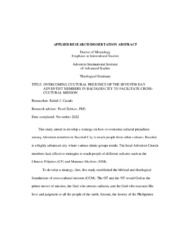| dc.description.abstract | This study aimed to develop a strategy on how to overcome cultural prejudices among Adventist members in Bacolod City to reach people from other cultures. Bacolod is a highly urbanized city where various ethnic groups reside. The local Adventist Church members lack effective strategies to reach people of different cultures such as the Chinese Filipinos (CF) and Maranao Muslims (MM).
To develop a strategy, first, this study established the biblical and theological foundations of cross-cultural mission (CCM). The OT and the NT reveal God as the prime mover of mission, the God who crosses cultures, and the God who executes His love and judgment to all the people of the earth. Second, the history of the Philippines
and the background of the Adventist Church in the Philippines support the necessity for an intentional CCM initiative and contextualized CCM strategies.
Furthermore, to reach the goal of this research, this qualitative study used focus group discussions and in-depth interviews. This study investigated the existing approaches used by some of the Adventist members who tried to reach the CF and the MM. This study revealed that traditional approaches have not been effective in reaching out to CF and MM. The findings of this study identified several challenges faced by Adventists in Bacolod City that need to be addressed for them to effectively engage in CCMs. These challenges include cultural values, assumptions, and prejudices of local Adventists towards CF and MM; lack of CCM training; unresolved missiological issues; and lack of CCM structure. Moreover, Adventists in Bacolod City were given an opportunity to suggest more effective CCM approaches based on their experiences.
As a result, a strategy on how to overcome prejudices while reaching people from different cultures was developed based on the Bible, extant literature, and empirical data. The strategy is divided into two parts: (a) the preparation stage and (b) the implementation stage. The first stage prepares the Adventist members, pastors, and leaders for CCM in Bacolod City. The second stage consists of the steps on how to implement the CCM initiative. The developed strategy ensures the establishment of a relationship-based mission and a contextualized approach to building relationships. | en_US |

